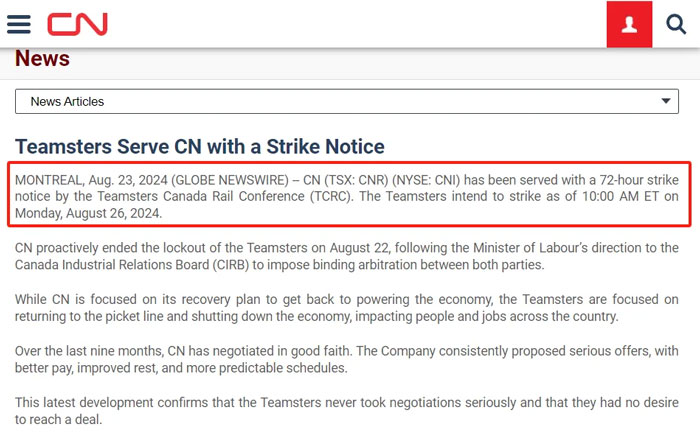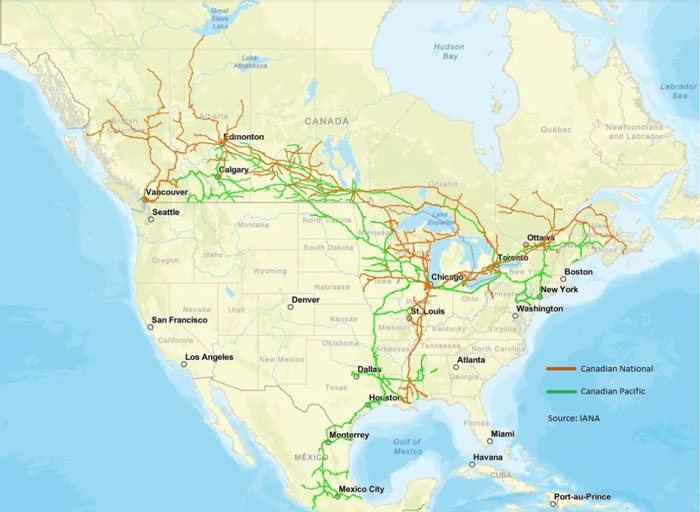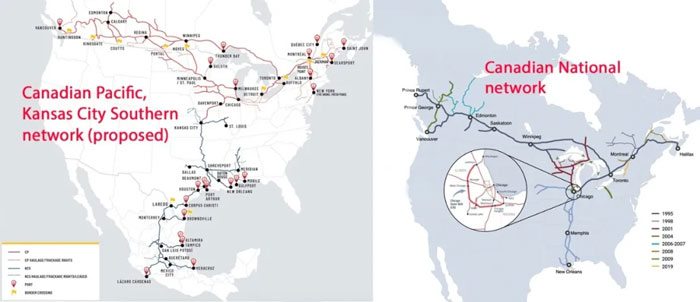

Canadian railway 26 officially entered the general strike
On August 24, local time, CN Railway received an official notice from the Canadian Railway Union (TCRC), announcing that the strike would begin 72 hours later, that is, at 10 am Eastern time on August 26. The strike notice, however, came shortly after CN announced it was ending its lockout and responding to the federal government's decision to impose binding arbitration.
At the instruction of the Minister of Labor, CN Railway quickly withdrew the suspension notice and gradually resumed operations on Friday morning. The situation at CPKC, however, was more complicated, with the suspension continuing as the railway union expressed dissatisfaction with the Labour minister's intervention and prepared to contest the constitutionality of the minister's actions.
A meeting between the employers and the CIRB began Friday morning and continued into the afternoon, but no final decision has been reached. If the CIRB can make a binding arbitration decision by Friday, both CN and CPKC rail workers will be required to continue or resume work. If the union is not satisfied with the ruling, they have the right to appeal to the court, but during the appeal period, rail services will still be required to operate normally.
The union has strongly opposed the arbitration process, arguing that the federal government has undermined the union's efforts to improve wages and working conditions by bypassing the collective bargaining process and ordering arbitration. In a statement, union President Paul Boucher stressed that negotiations are the union's main way to fight for rail safety, not just short-term economic issues.
On the other hand, the group representing Canadian grain producers also called on the railroad and the union to restore service as soon as possible, noting that each day of shutdown costs the economy $50 million. They stressed that for the sake of Canada's food, economy and national security, all parties should abide by the arbitration decision and resume normal operation of rail service.
For now, the labor dispute in Canada's rail system continues to simmering, and all sides are closely watching the CIRB's final ruling and possible follow-up actions by the union.
How big is the CN/CPKC rail strike?
CN and CPKC, which carry more than C $1 billion worth of freight daily, account for about three-quarters of the country's total rail capacity, and any strike could cost billions of dollars. Not only will the Canadian agriculture, chemical industry, energy industry, etc., suffer huge losses, but the U.S. supply chain will also be severely impacted.
The looming strike threatens to shut down nearly all of Canada's freight railroads, disrupting much of the rail traffic between the United States and Canada.
According to the Association of American Railroads, about 30 percent of Canada's rail freight enters the United States each year. Union Pacific said more than 2,500 of its freight trains a day would be unable to cross the U.S.-Canada border if Canadian rail was shut down. Jim Vena, the company's chief executive, warned that this could expose the U.S. and Canadian economies to "catastrophic consequences."
Union Pacific connects 23 states in the western United States, connects to the Canadian rail network and serves ports in Mexico.
In a letter to Canada's Labour minister, Vena said the Canadian rail outage could increase costs for many industries that will have to find alternatives to rail transportation, and that "for every day of disruption, it will take at least three to five days to recover, and possibly even more, as two Canadian rail companies are affected."

At the instruction of the Minister of Labor, CN Railway quickly withdrew the suspension notice and gradually resumed operations on Friday morning. The situation at CPKC, however, was more complicated, with the suspension continuing as the railway union expressed dissatisfaction with the Labour minister's intervention and prepared to contest the constitutionality of the minister's actions.
A meeting between the employers and the CIRB began Friday morning and continued into the afternoon, but no final decision has been reached. If the CIRB can make a binding arbitration decision by Friday, both CN and CPKC rail workers will be required to continue or resume work. If the union is not satisfied with the ruling, they have the right to appeal to the court, but during the appeal period, rail services will still be required to operate normally.
The union has strongly opposed the arbitration process, arguing that the federal government has undermined the union's efforts to improve wages and working conditions by bypassing the collective bargaining process and ordering arbitration. In a statement, union President Paul Boucher stressed that negotiations are the union's main way to fight for rail safety, not just short-term economic issues.

On the other hand, the group representing Canadian grain producers also called on the railroad and the union to restore service as soon as possible, noting that each day of shutdown costs the economy $50 million. They stressed that for the sake of Canada's food, economy and national security, all parties should abide by the arbitration decision and resume normal operation of rail service.
For now, the labor dispute in Canada's rail system continues to simmering, and all sides are closely watching the CIRB's final ruling and possible follow-up actions by the union.
How big is the CN/CPKC rail strike?
CN and CPKC, which carry more than C $1 billion worth of freight daily, account for about three-quarters of the country's total rail capacity, and any strike could cost billions of dollars. Not only will the Canadian agriculture, chemical industry, energy industry, etc., suffer huge losses, but the U.S. supply chain will also be severely impacted.
The looming strike threatens to shut down nearly all of Canada's freight railroads, disrupting much of the rail traffic between the United States and Canada.


According to the Association of American Railroads, about 30 percent of Canada's rail freight enters the United States each year. Union Pacific said more than 2,500 of its freight trains a day would be unable to cross the U.S.-Canada border if Canadian rail was shut down. Jim Vena, the company's chief executive, warned that this could expose the U.S. and Canadian economies to "catastrophic consequences."
Union Pacific connects 23 states in the western United States, connects to the Canadian rail network and serves ports in Mexico.
In a letter to Canada's Labour minister, Vena said the Canadian rail outage could increase costs for many industries that will have to find alternatives to rail transportation, and that "for every day of disruption, it will take at least three to five days to recover, and possibly even more, as two Canadian rail companies are affected."





